Peter MALONE
Saturday, 18 September 2021 19:48
N The Madness of Reason
N – THE MADNESS OF REASON
Belgium, 2014, 102 minutes, Colour.
Directed by Peter Kruger.
This is an arty and artful documentary, focusing on the life of Raymond Borremans, 1906 – 1988. He was a Frenchman who left Europe in the 1920s and made Africa his home. After exploring a great deal of Africa, he settled in Ivory Coast as his second home.
Flemish director, Peter Kruger, has explored Borremans’ life, not merely a biography, but a study and a portrait.
The film employs a double narrative, the French narrative by veteran actor, Michael Lonsdale, the African commentary and narrative by Wendyam some Adele girl. The French narrative offers information but raises many questions, many issues, many of them quite abstract and seemingly portentous (with a touch of the pretentious-sounding).
However, there are beautiful vistas of several African countries and of the Ivory Coast.
Borremans studied butterflies and other elements of nature, and these are visualised. He also wrote songs, one of which is presented in a luxury hotel lounge with a local singer and ensemble. He also wrote an encyclopaedia of the Ivory Coast and there are details of his compiling it, writing it and publication eventually in his later life.
All the way through, there are ruminations about the meaning of life and life in the context of the African continent.
Of the, there is a focus on the history of Ivory Coast, its establishment and its prosperity, the exploitation and the poverty. Symbolic of this is the Basilica of Our Lady of Peace at Yamoussoukro. It is a metre higher than St Peter’s in Rome on which it is based. The narrative asks questions of the Ivory Coast President who created this – and his seated memorial is in the foyer of the basilica.
This leads to the realities of the civil wars at the beginning of the 21st century, the sides, refugees from other countries, security borders, the destruction, the effect on the people and their poverty.
It also leads to considerations of global sameness, capitalism and consumerism in the 21st century, as well as the hedonism that has developed everywhere, clubs – and pornography.
The portrait of Borremans is interesting and challenging, the film is very interesting as a portrait of Ivory Coast as seen by an expatriate of the 20th century.
Belgium, 2014, 102 minutes, Colour.
Directed by Peter Kruger.
This is an arty and artful documentary, focusing on the life of Raymond Borremans, 1906 – 1988. He was a Frenchman who left Europe in the 1920s and made Africa his home. After exploring a great deal of Africa, he settled in Ivory Coast as his second home.
Flemish director, Peter Kruger, has explored Borremans’ life, not merely a biography, but a study and a portrait.
The film employs a double narrative, the French narrative by veteran actor, Michael Lonsdale, the African commentary and narrative by Wendyam some Adele girl. The French narrative offers information but raises many questions, many issues, many of them quite abstract and seemingly portentous (with a touch of the pretentious-sounding).
However, there are beautiful vistas of several African countries and of the Ivory Coast.
Borremans studied butterflies and other elements of nature, and these are visualised. He also wrote songs, one of which is presented in a luxury hotel lounge with a local singer and ensemble. He also wrote an encyclopaedia of the Ivory Coast and there are details of his compiling it, writing it and publication eventually in his later life.
All the way through, there are ruminations about the meaning of life and life in the context of the African continent.
Of the, there is a focus on the history of Ivory Coast, its establishment and its prosperity, the exploitation and the poverty. Symbolic of this is the Basilica of Our Lady of Peace at Yamoussoukro. It is a metre higher than St Peter’s in Rome on which it is based. The narrative asks questions of the Ivory Coast President who created this – and his seated memorial is in the foyer of the basilica.
This leads to the realities of the civil wars at the beginning of the 21st century, the sides, refugees from other countries, security borders, the destruction, the effect on the people and their poverty.
It also leads to considerations of global sameness, capitalism and consumerism in the 21st century, as well as the hedonism that has developed everywhere, clubs – and pornography.
The portrait of Borremans is interesting and challenging, the film is very interesting as a portrait of Ivory Coast as seen by an expatriate of the 20th century.
Published in Movie Reviews
Published in
Movie Reviews
Tagged under
Saturday, 18 September 2021 19:48
Praira do Futuro/ Beach of the Future
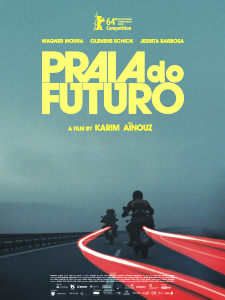
PRAIRA DO FUTURO/ BEACH OF THE FUTURE
Brazil/Germany, 2014, 106 minutes, Colour.
Wagner Moura, Clemens Schick, Jesuita Barbosa.
Directed by Karim Anouiz.
This film featured in the 2014 Berlin Film Festival. It was well received by Brazilian critics and some locals but did not have a strong impact on wider audiences.
In theory, it should have made a better impression. The film opens strikingly with motorcyclists on the coast of Brazil, driving through the roads and sand, the two riders then going into the ocean for a swim, one getting into difficulties and drowning, the other rescued, and the film focusing on the lifesaver.
Very quickly, the gay theme is introduced as the lifesaver and the survivor have a sexual encounter. One of the main difficulties for the film is that there seems to be very little, almost no chemistry between the two central characters, so that their sudden relationship does not convince – and this is true of the later sequences, even though they are meant to be quite intimate and the two falling in love. Brazilian actor Wagner Moura plays the lifeguard and German actor, Clemens Schick plays the survivor, (the two Germans had served together in Afghanistan and were returning home after travels to work together in a garage, the man who died having a wife and child).
The German calls the Brazilian a coward for not leaving his family and coming with him to Germany. The lifesaver has strong family bonds, with his devoted mother and with his younger brother who is introduced to the German and is attracted by the cars. He goes to Germany and, when challenged, does not go to the airport.
Germany seems very cold to the lifesaver – and there is no beach to hand. While the two maintain their relationship for some time, it is clear that the Brazilian is uncomfortable, has some regrets in leaving his family, but has decided to make a new life away from them all.
Years pass. The relationship has broken though the two men see each other. What makes a difference for the last part of the film is the arrival of the younger brother from Brazil, now a late teenager, spending two weeks searching for his brother and eventually finding him, attacking him for leaving home, and missing the death of their mother.
There is some reconciliation between the younger brother and the older brother who now works in an aquarium, cleaning the glass for the exhibits. He also meets the German who takes him under his wing after a clash and a rough sexual encounter with a girlfriend.
We presume that, eventually, the three will become friends, the Brazilian will revive something of his life, the German will continue the friendship and the young man, actually following the example of his brother, leaves Brazil and finds a new home.
Published in Movie Reviews
Published in
Movie Reviews
Tagged under
Saturday, 18 September 2021 19:48
To Singapore, With Love
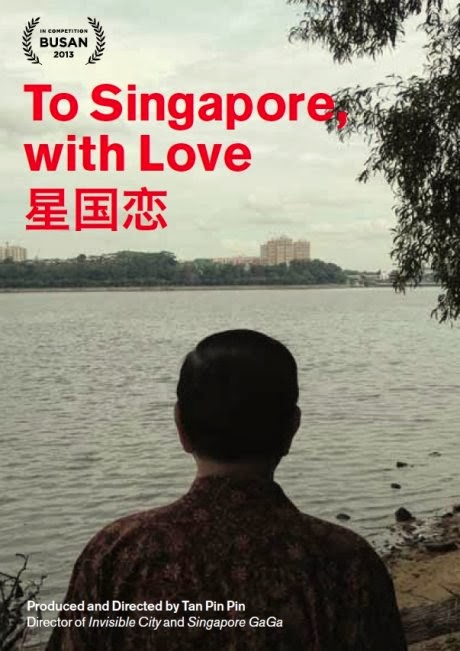
TO SINGAPORE, WITH LOVE
Singapore, 2013, 70 minutes, Colour.
Directed by Tan Pin Pin.
To Singapore, With Love is not one of those omnibus films with many directors telling stories about the city that they love. Rather, this is the sentiment of a number of political exiles, some since the 1960s, some since the 1970s, who still wish to go back to their home, where they grew up, Where they fought for political freedom before their exile.
Documentary maker, Tan Pin Pin interviews a number of these exiles who live in London, in Malaysia, in Thailand.
Her interviews are very telling and the interviewees come across very powerfully, as characters in themselves, in their memories of their protests and their arrests in the past decades, and as peaceful persons in the present, still longing to go home.
One particular focus is on activist, Francis Khoo, with footage of his activities, often exuberant, devout Catholic, writer of songs, protest leader who married his fiancee a few weeks before his internment. And she was to follow. She is one of the most impressive presences on screen, Ang Swee Chai, a physician who went into exile in London with her husband, at times finding things very difficult, but eventually winning respect and becoming a surgeon. She has been particularly active since in setting up a medical aid foundation for Palestinians. She is interviewed several times, is seen with her family, and makes a deep impression by the integrity of her life and witness to her beliefs.
Another character, rather lively, is the Tan Wah Piow. He interviews well and there is footage and imagery of his protests as well. Again, he lives in exile in London. He is the author of several books and a launch in Kuala Lumpur is a feature of the film.
The third central character is Ho Juan Thai, another activist, older than the others, who remembers the days of the past, has a great desire to go back to Singapore, and can only visit with his elderly mother when she crosses the Causeway into Malaysia.
While there are not many scenes of Singapore, except looking across from Malaysia into the city, the impression of Singapore is very strong, its history, the strict legislation under Lee Kwan Yew, and the repressive measures on protesters, especially in 1963 when a number were exiled, in the mid 1970s and again in the 1980s.
The film has as its focus Singapore, but could easily be the same story for many other repressive countries, far more repressive than Singapore itself.
This is a timely film for remembering the developments in Singapore as well as the repression in the latter part of the 20th century.
Published in Movie Reviews
Published in
Movie Reviews
Tagged under
Saturday, 18 September 2021 19:48
Three Blind Mice/ 2008
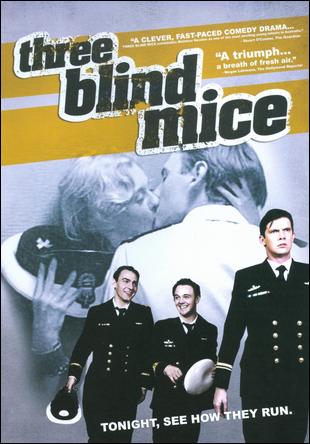
THREE BLIND MICE
Australia, 2008, 94 minutes, Colour.
Matthew Newton, Toby Schmitz, Ewan Leslie, Gracie Otto, Pia Miranda, Heather Mitchell, Barry Otto, Tina Bursill, Jacki Weaver, Bud Tingwall, Brendan Cowell. Bob Franklin, Alex Dimitriades, Marcus Graham.
Directed by Matthew Newton.
Three Blind Mice was written and directed by Matthew Newton. Newton also takes the central role of the unsympathetic sailor, Harry. Newton has had a successful career but has had problems in real life. This film shows what he is capable of in terms of writing, on directing, acting.
The three blind mice of the title are three sailors, on leave before taking up duties again. There have been problems with one of them, Sam, Ewan Leslie, who has been humiliated and hazed. One of the sailors, Dean,Toby Schmitz, has participated in the hazing and is ashamed. The third sailor is Harry, played by Matthew Newton, irresponsible, playing pranks and forgetting that he has set them up, blunt in his talking with people.
The film is very much dialogue-driven, especially the opening sequences in the hotel with the three sailors, establishing their characters and the tensions. There are scenes between Sam and a young woman whom he has met while the others play cards. He spends some time with her, eventually taking her home to meet his mother, a very acerbic Jacki Weaver, and his grandfather, played by Charles Tingwall. These scenes are quite psychologically dramatic and powerful.
The other strong sequence is that of the meal which Dean has with his fiancee, Pia Miranda, and interesting cameo turns by Heather Mitchell and Barry Otto as her parents. This is a sequence where uncomfortable truths untold.
Sam returns to the hotel and is beaten by the pimp of the escort that Harry had organised and forgotten. The pimp gets the worst of the fight and most of the characters finish up at the hospital. The three sailors have to think through whether they will go AWOL or whether they will return to duty.
1. The title, the sailors, see how they run…?
2. The work of Matthew Newton, writing, directing, acting? Taking an unsympathetic role? The relationship of his character to his real life and problems?
3. The film as dialogue-driven, conversations and interactions? Character-driven? Characters responding to events?
4. The strong Australian cast?
5. The Australian Navy, after 9/11? Duties, hazing and the responses, victimising fellow sailors, decisions to leave, reactions? AWOL?
6. The introduction to the three, Harry and his forceful personality, Dean and the issue of torturing Sam, his worrying about his fiancee and her family? Sam, his experience of trouble, torture? His relationship with his mother?
7. The night before sailing, Sam and the effect of his experience, having the shower? Harry, the phone call, booking the escort, the deals, the details – and his being careless and forgetting?
8. The talk among the three, establishing their characters? Going out, the restaurant? Emma and her liking Sam? Their being together? The other two, joining the card came, the characters playing cards, the reactions?
9. Sam and Emma, walking, talking, their characters, the different backgrounds, leaving the card came, on the roof? Sam going home to his mother? Her reaction, comments on Emma? Going to the hotel, the attack on Sam by the pimp, because of Harry’s carelessness?
10. Sam, his mother, the phone calls, her pressure on him, his arrival, her reactions? The different with Pop? Talking with Pop, drinking? His mother and her nastiness, criticising Sam, criticising Emma? Pop wanting a celebration for the promotion?
11. Dean, games with Sam, following Harry? The card game? Walking the streets? The meal, his fiancee, the chat, her parents, their reactions, the issue of torture? The drinking, the advances? Therapy? The mother and her behaviour? The ineffectual father? Dean talking with his fiancee? AWOL or not?
12. Harry, his responsibility, playing games with people, the meal, the talk, bluntness in his talk, to Deans fiancee’s mother? The return, finding the blood?
13. The hotel, the pimp in the attacks, his injuries, going to hospital, the prostitute present, her reaction?
14. The final confrontations, the truth? Their going back to the Navy, on duty?
Published in Movie Reviews
Published in
Movie Reviews
Tagged under
Saturday, 18 September 2021 19:48
Blue is the Warmest Colour/ La Vie d'Adele- Chapitres 1 et 2
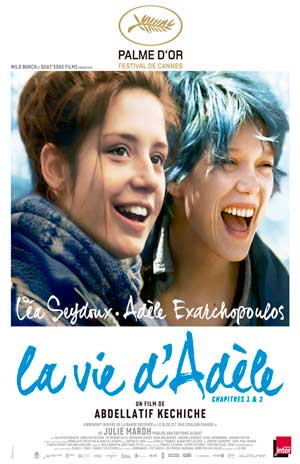
BLUE IS THE WARMEST COLOUR/ LA VIE D’ADELE –CHAPITRES 1 ET 2
France, 2013, 179 minutes, Colour.
Adele Exarchopoulos, Lea Seydoux.
Directed by Abdellatif Kekiche.
Blue is the Warmest Colour is an arresting title although it is not quite explained during the film. The French title is much more realistic, The Life of Adele, Chapters 1 and 2. This title appears on the film itself.
The film was warmly received in Cannes, 2013, winning the Palme d’Or.
However, the film was not without a great deal of controversy, at the festival and with the films distribution. While the film is the story of a young woman, starting at the age of 17 and moving into her young adult years, it is a study and close portrait of Adele, growing in self-awareness and coming to the realisation of her sexual orientation. At first, this puzzles her, until she sees a young woman in the distance, a striking woman, with a blue hair rinse. She watches in fascination, feeling the first stirrings of attraction.
The woman with the blue hair, Emma, comes into life, meeting her, talking in a friendly manner, the two sharing their lives and hopes. The attraction becomes stronger, becoming a forceful sexual attraction which leads to sexual encounters between the two young women. There are several scenes of sexual intimacy, quite detailed in their sensuousness and sensuality – which challenges the audience to ask themselves whether they are empathising with the two women and their experience and love or is this something prurient, even voyeuristic (or both). It should be said that this is a very long film, three hours, and the first explicit encounter does not occur in the film until after 75 minutes, which gives a strong context for the scenes, and with so much of the film yet to come in the study of the two young women.
Adele Exarchopoulos is able to hold the story together, from the eager schoolgirl running for the bus at the beginning, to talking with her friends at school, often with some sexual curiosity, to her hopes to become a teacher, to her training and qualification (which occur off-screen), to her working with kindergarten children with some tenderness, a little more moody when she has to teach writing and dictation, but, despite the disappointments in her life, she is resilient.
Lea Seydoux is Emma. She already has quite a number of films in her career, especially Lourdes and Farewell My Queen. At first glance, with her blue hair, audiences might make judgements about her. In fact, she is a very sympathetic character, an art student with talent for painting, succeeding in her profession with several exhibitions. As she encounters Adele, she gradually falls in love and the experience with Adele has profound effect on her.
But, as the years pass, and as with heterosexual couples, life takes on a more even pace, passion diminishes, and there is the possibility of fidelity and infidelity, the dying of the relationship. This has quite a profound effect on Adele, who loves Emma and has become strongly emotionally dependent on her. It is not the same with Emma who becomes enraged when Adele behaves stupidly and risks their partnership.
The director has made some interesting films, including La Grain et le mulet/ The Secret of the Grain. He is originally from Tunisia but has lived in France, bringing a different sensitivity and sensibility to his film-making, especially from male director making this very female-centred film.
But he is a skilful storyteller, maintaining a quietly even pace, highly attentive to details of background and in the characters’ behaviour, so that the audience feels within an hour that they have got to know the two characters well – and the reality of another two hours running time to understand them and appreciate them better.
A challenging film for all different stances in these years of diverse public and private opinion on same-sex relationships and commitments.
1. The reputation of the film? Its awards, prize at Cannes? The controversies about its sexual themes and treatment?
2. The two titles, the French title with The Life of Adele, Chapters 1 and 2? The title of the original novel, Blue is the Warmest Colour, the title used for international distribution?
3. The impact of the film, its length, attention to detail, the telling of a day-by day story, intimate detail? Emotional? Audiences identifying with Adele and Emma? Or not? The story of a young woman, growing up, self-awareness, sexual awareness, shock, adaptation and learning about herself?
4. The theme of sexual orientation, influence on character and behaviour, importance for life and commitment, love? For personal choices? For personal struggle? Love and self-giving, dependence?
5. Adele’s story, aged 17, emerging from the house, running for the bus, going to school, the group of friends at school, the girls, the gay boy and his friendship, as a confidant? The prurient questions and discussions? Writing her diary? At home, the spaghetti meals, a love for her parents, their care for her? Her room? The boy at school, the girls talking about him, the date, the experience, the sexual experience? Adele’s reaction? Her girlfriends wanting to talk about detail?
6. Adele seeing Emma, with the group, the women, striking blue hair? The interest and attraction? Adele watching her? The meeting, the talk, the gay boy and going to the club, the camera focusing on the gay couples and their intimacy, behaviour? Adele’s reaction, puzzle, reticence, fascination? Meeting Emma and their talking?
7. The kiss with the school girlfriend? The impact on Adele, the girl saying not to make too much of it? The contrast in talking with Emma, sharing the stories, self-discovery, the girls and their reaction to Emma? Going to Emma’s house, enjoying the meal, the sexual experience, the intimacy? Going to Adele’s house, the spaghetti meal? The sexual experience in her room? Emma’s parents and their awareness of their daughter’s orientation? The 18th birthday party, all the friends, Emma coming? Emma and her art, Adele posing?
8. Emma, the blue hair, with the group, her butch style, studying art, coming to meet Adele, the friendly talking, the effect, the age difference? The sexual encounters and their significance for each girl? Going to the meals, her previous life, approving parents, a group of friends, Adele posing for her, going out, the parties, the exhibition? Emma’s friends, artists, actors, gay men and women?
9. Adele and her interest in being a teacher, doing something for others? The off-screen study and qualifications? Seeing her as a teacher, with a little ones, playing, a natural warmth with them? The dictation classes, reading and writing, on the blackboard? The changing moods? Her co-teachers and their participation in the classes?
10. Emma, busy with her art? Adele and her spending nights with the fellow-worker? Coming to tell Emma, lying, Emma’s insistence, forcing the truth out of her, Adele weeping, saying she did not know why she had done it? Repentant? Emma, a strong tone, even vicious, ousting Adele and calling her a slut?
11. Adele, wandering, feeling hurt? Going back to classes, the scenes at the beach? Keeping busy, resilience?
12. Emma, Lisa at the party, her pregnancy, former companion? Adele, the actors, the discussions?
13. Time passing, the invitation to the exhibition, Adele dressing nicely, walking, going into the exhibition, seeing the paintings, the past paintings of herself? Meeting the actor and the discussion? Sadness, talking with Emma, congratulating her, quietly leaving?
14. The effect on Adele, having to move on, the scene in the restaurant, Adele and her dependence, weeping, touching and licking Emma, the kiss, her hopes? Emma, the responses, unable to commit herself, asking forgiveness? Living with Lisa, a new life?
15. Adele, walking alone, hurt, dependent? For Adele’s life, Chapters 1 and two? Chapter 3?
Published in Movie Reviews
Published in
Movie Reviews
Tagged under
Saturday, 18 September 2021 19:48
Skinwalkers
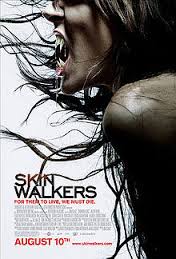
SKINWALKERS
US, 2006, 84 minutes, Colour.
Jason Behr, Elias Koteas, Rhona Mitra, Matthew Knight, Wendy Crewson.
Directed by Jim Isaac.
Skywalkers is a brief contemporary horror film, drawing on the werewolf tradition? It is more in the vein of the werewolves in Twilight rather than the more classic stories. An introduction informs the audience that the tradition comes from Native American stories, two tribes of werewolves, one in favour of keeping their rampaging nature, the other wanting to end the curse and return to normal. The story is that the special 13-year-old boy, half werewolf, half human, has to survive a blood moon and the curse will be removed.
The film opens with one group attacking the other, an attempt to find the whereabouts of the young boy. When the enemy finds out, they ride their bikes to a town where the boy has been preserved by the community for all the years.
The Bikies come with guns blazing, a kind of contemporary High Noon, which means that the family has to flee. There are dangerous pursuits, fights, building up to a climax in a factory and the boy having to survive until midnight.
1. An interesting horror film? Contemporary? The Native American traditions? The werewolf traditions? The combination?
2. The locations, forests, the town, the streets, homes, warehouses and factories? The musical score?
3. Title, the explanation, the Native American Indians and their traditions? How credible?
4. The initial information, the skinwalkers, those who wanted to remain werewolves, those who wanted to end the curse?
5. The confrontations, pro and con, the warriors? The werewolves having to be locked in at night? Their thirst for blood – any blood?
6. Caleb as leader, the girl, the sexual relationship? The confrontation with the werewolves at the beginning? Chase, findings the restrained werewolves, the threats, the torture? The photo and seeing the town of Huguenot in the mirror? Bikie gang?
7. The family, Rachel and her not knowing the truth, caring for Timothy? Adam and Jonas’ daughter, their love? The black postman? The grandmother? Jonas and his brother-in-law, his daughter? The story of his mother’s death? The driver who was not werewolf? The black postman, storekeepers?
8. The boy, aged 13, half werewolf, half human? The prophecy? His survival and the end of the curse? The visuals of the blood moon?
9. Rachel not knowing the truth, at home, in the shop, the guns in the street, her dismay, protecting Timothy? Caleb, the group, the shooting, everybody in
the town coming to the defence? The confrontation with the grandmother, her saving Timothy, her being shot trying to get into the truck? Contemporary werewolf High Noon?
10. The truck, the driver and his help, the escape, Rachel and her disbelief, the werewolves in their confinement at night, the transformation, horror?
11. The group catching up, the battle, the deaths, the capture of Jonas’ daughter? The sudden death of the driver? The killing of the others, the black
postman? The capture of the daughter? Torture?
12. The escape, the small group in the truck, and returning the girl, Adam bringing her back, her being infected, lies, killing out of? Her father in his constraint, trying to escape, having to kill his daughter? Her trying to cajole Timothy to come so that she could kill him?
13. Arrival at the warehouse, the night, Jonas and his warning that there was the thirst for blood, anybody’s blood, and they were to shoo him if they were in danger? Rachel and Timothy concealing themselves? The werewolves and their mutual attacks, fights and deaths? Jonas death?
14. Caleb, the irony of his being the father of Timothy, transformed, trying to kill Timothy, midnight, Timothy surviving midnight, Caleb and his being transformed back to normal?
15. The ending, Timothy and the blood samples and the ability to cure werewolves? The family going to the motel, the Halloween Grim Reaper costume, and the happy future?
Published in Movie Reviews
Published in
Movie Reviews
Tagged under
Saturday, 18 September 2021 19:48
Blackjack: At the Gate
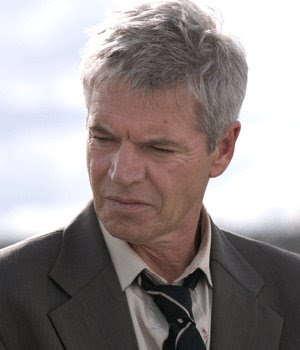
BLACK JACK: AT THE GATE
Australia, 2007, 100 minutes, Colour.
Colin Friels, Marta Dusseldorp, David Field, Sophie Lee, Robert Mammone, Tom Long, Rebecca Rigg, Libby Tanner.
Directed by Peter Andrikidis.
Black Jack: At the Gates is the sixth in a series of Channel Ten productions focusing on a detective, Jack Kempson, played by Colin Friels. Jack Kempson is in charge of cold cases and opening up investigations and solving them. Colin Friels is at home in this kind of role after his starring in the series Water Rats. Marta Dusseldorp, who appears in many of the films, is an engaging assistant. David Field is the obtuse police commander. There is an interesting supporting cast of character actors from Australian television. David Field has more to do in investigation and clashes with Jack. Sophie Lee is the DNA expert instead of the customary Doris Younane.
The film, as with a number in the series, was directed by Peter Andrikidis who has worked in television direction since the late 1970s.
1. The entertainment value of this kind of film? The series? Familiarity with the central characters?
2. The Sydney settings, the city itself, landscapes, buildings, streets? The interiors for the police precincts, shops, warehouses, garages? Authentic atmosphere? The score?
3. The team investigating: Jack Kempson in charge, a loner, abrupt, hard on Sam? Sam and her decision to work for the policer? Kavanagh as ambitious, obtuse, lacking imagination? Denise, forensic evidence. The superiors giving consent to Kempson to continue his investigations?
4. Jack, hard on himself, and Sam? Breaking into the house for Liz, on the ladder, breaking things? His interview with Sylvia? His presumptions about lives and the relationship? His broadmindedness? The awkwardness with Sylvia, her complaint Kavanagh? His asking Sam to take on surveillance? The visit of the wife, going to seek Tom in the church? Interviewing the babysitter on the station? Going to see Stephanie? Going to Michael’s home, talking to his son, in the garage? The surveillance on Michael? The list of people doing repairs, the connections? The interviews?
5. Sam, her work with Jack, his being hard on her, the request of the surveillance, her watching Stephanie, the lead to Michael? Back to the church? The interviews? Sympathy for the mother?
6. The opening, Lisa Tom, clash, his walking out, the babysitter, the baby upstairs, the intruder, the violence, fire? The rules? The funeral of the baby? And the irony, years later, of Jack and Sam opening the coffin and finding the bones? And the baby alive?
7. 11 years passing, Jack and his memories, this accident, physically, holding her hand, wishing her back to life? Liz, her crutches, independence, clash with Sylvia, the money, Jack offering the money, Sylvia’s pictures, his assmuptions about the relationship between Liz and Sylvia? Her reassuring her father?
8. The religious atmosphere, the church, the project, the couple together, Lisa singing, three children, the eldest of the questions about love for him and whether he would have been born had the baby not died?
9. Lisa, the visit to Jack, wanting the photo, the visits to the church, the discussions, Lisa and her wanting the baby? Discussions together, the revelation of the affairs, Michael and the possibility of being the baby’s father? His setting the fire and kidnapping the baby?
10. Jack’s story, relationship with Denise, staying over, the police seeing her, fear that she was pregnant, her age, Jack not a prospective father – and his answer that he raised Liz? exasperation with Jack, even with him at the DNA checks, the music, at the end, her smile?
11. Stephanie, ill, saying she didn’t know the family, the evidence boxes and her father’s hammer, the surveillance, Sam hearing the discussion in the shop, the discussions with Michael, the money? The threats to tell everything
12. Stephanie, abducting Luke, the gun, coming to the church, the revelations?
13. Everyone present, the truth, the DNA, Lisa and Tom being the parents of the child, the decision not to tell him – for his good?
14. Sam and Jack watching Lisa and Tom, thinking they should Luke tell the truth? Sam and Jack watching Lisa meet Luke? Jack’s confrontation with Michael, especially his motives? And the concealment for the protection of Luke?
15, The detective work, the leads, methods? And not revealing the truth and Kavanagh thinking, once again, they had wasted their time and resources?
Published in Movie Reviews
Published in
Movie Reviews
Tagged under
Saturday, 18 September 2021 19:48
Fra Diavolo/ The Devil's Brother
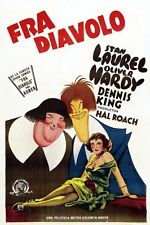
FRA DIAVOLO/THE DEVILS BROTHER
US, 1933, 90 minutes, Black and white.
Stan Laurel, Oliver Hardy, Dennis King, Thelma Todd, James Finlayson.
Directed by Hal Roach and Charles Rogers.
Fra Diavolo is a mixture of Laurel and Hardy slapstick comedy with an operetta of the same name by Auber. To that extent, it is something of a hodgepodge, although they did play in the musical Jack and the Beanstalk by Sigmund Romberg.
It was directed by veteran, Hal Roach, who had been making short films since 1916, a very extensive list of comedy films.
The plot is something reminiscent of the Zorro, a bandit in northern Italy masquerading as a lord in order to rob the rich. He is played by stage operetta singer, Dennis King, who had a great reputation in his time. In the supporting cast is Thelma Todd as a wealthy lady and James Finlayson as her older husband, something of a fop, something of a fool.
Into this operetta atmosphere, with songs from King as well as chorus songs, come Stan Laurel and Oliver Hardy. They are talking about the money they have saved for many long years when Ollie takes it from Stan and they are immediately robbed. They decide to become bandits although they don’t know how, hearing about Il Diavolo, they decide to emulate him with their first opportunity spoilt by a man pleading desperately to keep his money. Then they try to rob Il Diavolo himself. They are mocked by his group and it is decided that they should be hanged. But Il Diavolo leaves it to Stand to put the noose around around Ollie’s but fails to fulfil the execution. They then become servants to Il Diavolo.
Meanwhile there are flashbacks to Il Diavolo serenading the rich young woman who shows him her jewels which he intends to rob. She has a foppish husband and it is easy for Il Diavolo to steal both jewels and heart. There is a small subplot about the leader of the police in the viIlage and the daughter of a storekeeper who is in love with him.
Being in the town provides for some opportunity for Laurel and Hardy to do some of their slapstick, physical humour, verbal humour.
But, in the end, both Stan and Ollie stand in the line of the firing squad with Il Diavolo.
Laurel and Hardy had made a number of short films but made a number of features from this time to the mid 1940s.
Published in Movie Reviews
Published in
Movie Reviews
Tagged under
Saturday, 18 September 2021 19:48
My Way/ Mei Wei
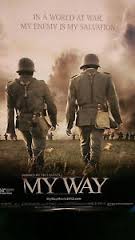
MY WAY/ MEI WEI
Korea, 2011, 137 minutes, Colour.
Dong-gun Jang, Jô Odagiri, Bingbing Fan
Directed by Je-kyu Kang
My Way is not the most impressive title for this quite impressive film. It is a Korean production, not expensive by Hollywood standards, but a big-budget film, many locations, significant and detailed battles, the re-creation of the 1930s in Korea, and the humiliation of the Japanese occupation, and their arrogant imperialist attitudes. The action moves to China, Koreans involved in riots sentenced to serve in the Japanese Army and fighting China, some devastating battles.
The later action transfers the prisoners to Russia, harsh conditions in the prisoner of war camp, in the snow and winter. Then come the Germans and the capture of the Koreans and their being transferred to the Western front. The finale of the film takes place on the Normandy coast, a picture of the Germans and their settling in, digging, in to defend the continent of Europe, the Normandy landings with echoes of Saving Private Ryan, but with more details about the Germans and their actions.
At the core, there is a human story, an arrogant little Japanese boy coming to Korea, his grandfather being the officer in command, and a local boy who is a strong runner. They compete and this is something which pervades the whole film, no matter what the situation. What begins in animosity and continues even through racism and hatred, find some kind of compatibility and mutual help by the end – and with a twist to the opening sequence in the London Marathon on with which the film concludes.
1. The impact of the film? For a Korean audience? Japanese? Chinese? Russians? Germans? Allied countries? Universal impact in the 21st century?
2. The production values, recreating Korea in the 1930s? Costumes and decor? The Japanese occupation? Korean cities, marathons? The war, in Korea, in China, the battles and in detail, Russia, the snow at the camps, battles? Germany? Normandy, the recreation of the landing and the defence? The London Marathon? The scope of the film? International interest?
3. The history of the Japanese occupation of Korea and China? Japanese imperialism, arrogance, loyalties and manifestations? Tatsuo, the focus on him as a boy, his parents and their work in Korea, his grandfather and his command? Young age, arrogant, interactions with the Koreans, looking down on them, the race with Jun-shik, the consequences? The terrorist act, the presentation of the bomb, the grandfather falling on it to save the others?
4. Tatsuo growing up, his studies, Jun-shik, also growing up, living in the suburbs, poverty, pulling the rickshaw? His skill in running? Training? Koreans being excluded from the marathon? The champion in his ritual, going into plead his case before the board, his being accepted, running, his being tripped, accused of cheating, robbed of his award? Tatsuo and his wanting to win in his own right?
5. Jun-shik’s friend, love for his sister, the reaction to the exclusion, the riots, group lined up, the sentence to serve in the Japanese Army?
6. Tatsuo, his family, his career, study, not wanting to shirk his duty, going into the military, arriving at the camp, his harshness, condemning any retreat?
7. Troops transferred to Mongolia, the battles, command, sounding retreat? Tatsuo and his harsh judgement? Stern discipline, condemnation of the commander for retreating, his harsh approach, attitude towards the Koreans?
8. Punishments, defiance, Jun-shik and the hardships for the Koreans, his attempt to escape, his seeing the Russian tanks, his return, the attempted warning? The battle, the strong detail, brutality? Tatsuo and his involvement, the defeat, the humiliation, capture?
9. Jun-shik surviving, interactions with Tatsuo, helping? The humiliation for Tatsuo?
10. The Chinese girl, crack sniper, killing the Japanese but not the Koreans? Captured, telling her story of the Japanese rapes and murders? In the hole, Jin-shik and his help, her gratitude? Her death?
11. Prisoners, transfer to Russia, the cold, the snow, the hard life? Jun-shik’s friend becoming Anton? Commander? Relationship with the Russian commanders? Memories of the past? Jun- Shik and Tatsuo in the camp? Their stories? The Russian ethos, as harsh as the Japanese in Korea? The German approach, the threat to Russia? The camp and conditions, the prisoner stealing the bread, execution? the fights, Anton and their defying him? The details of life in the camp? The two men becoming more friendly? Tatsuo more humble? The build-up to the execution squad, the sudden intervention and survival? Anton and his plea to Jun-shik? The photo of his sister? Survival by changing uniforms?
12. The battles, the victory of the Germans? The two men hiding, Tatsuo wounded, Jun-shik and his seeking the medicine, his being captured, taken by the Germans?
13. Three years passing, transition to Normandy, the detail of the Germans and the entrenchment, some contemplating desertion? The two men finding each other? Running on the beach?
14. The background of the rivalry, imperialism, racism, hatred, what the two men had in common, the change in respect, helping one another, comrades?
15. The plan of the escape to Cherbourg? The planes attacking? The landing on the Normandy beaches? The picture of the allies, the boats, the men, in the water, being killed? The Germans, firing on them? And the escape?
16. Jin-shik and his wound, bonding with Tatsuo, urging him to take his name and give him some immortality?
17. The London Marathon, Jun-shik and his winning – and Tatsuo commemorating his memory?
Published in Movie Reviews
Published in
Movie Reviews
Tagged under
Saturday, 18 September 2021 19:48
Heaven's Pond/ Devil's Pond

HEAVENS POND/DEVILS POND
US, 2003, 84 minutes, Colour.
Kip Pardue, Tara Reid, Meredith Baxter.
Directed by Josh Viertel.
Heaven’s Pond was the working title of this film. It was released as Devil’s Pond in the United States but throughout the world as Heaven’s Pond.
The film is a two-hander, between Kip Pardue, Mitch, and Tara Reid, Julianne, as newlyweds. Meredith Baxter has a moment or two as Tara Reid’s mother. After the wedding ceremony and reception, the couple go on a honeymoon into the woods, onto a shack on an island. Julianne is afraid of water, can’t swim, but has not told her husband. He is a man about the house, doing repairs, fishing… However, tensions begin to arise, Julianne uncomfortable on the island and wanting to go home, Mitch asserting his rights as husband for their mutual decisions – and he is not wrong in accusing her of being spoilt and dependent on her mother.
The tension builds to confrontations and Julianne finally walking to freedom.
1. A small film, two-hander? Effective screenplay, performances, photography?
2. The plausibility of the plot and characters? They behaviour during the honeymoon? Clashes? Crisis?
3. The opening with Julianne, injured? A framework for the flashback?
4. The wedding, the ceremony, with the consent, the focus on Julianne, Mitch and his response? Reception, farewell, Julianne’s mother and her concern?
5. Travelling to the house, the two weeks’ honeymoon, the isolation, the natural beauty, driving through the woods, coming to the lake, the house of the lake?
6. Julianne and her hesitations, and not revealing she could not swim, fear of water, lying on the float and its overturning, Mitch rescuing her?
7. The house, old, previous inhabitants, hunters? Settling in, the early days of the honeymoon, love and devotion? Mitch teaching her to fish? Setting traps? The touches of tension?
8. The second week, Julianne wanting to go home, Mitch refusing? The petulance, his being correcting in calling her a spoilt princess? Dependent on her mother? Her not being able to call her mother? His apologies, her tantrums?
9. The audience siding with Julianne and her fears and wanting to go home? The audience siding with Mitch, considering his wife’s being spoilt?
10. The mystery box, the drawings, Julianne getting the key, opening it, finding the deed for the house? Mitch and his dead father, the grave in the woods?
11. Julianne and attempts to escape, fishing out the cushiion from the water? Deceiving Mitch?
12. The truth, Mitch and his wanting to stay in the woods, being possessive of his wife, lying to her but loving her? Her attempts to escape, in the truck, unable to start it, getting the gun?
13. The final confrontation, her getting the best of Mitch? Getting through the water? Walking to freedom?
Published in Movie Reviews
Published in
Movie Reviews
Tagged under